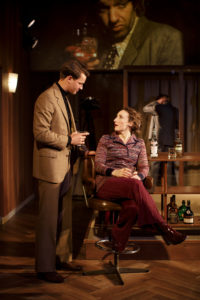Hayes Theatre, October 26
8/10
This was a gutsy move. A more timid theatre may have shied from reopening with Stephen Sondheim’s biggest Broadway flop. But Merrily won’t flop this time, and singing It’s a Hit won’t be the excruciating experience it must have been for the cast in 1981.

The causes of the Broadway failure were shared between Hal Prince’s production, venomous critics and the convoluted narrative. Sondheim (music and lyrics) and George Furth (book) tell the story backwards, starting in 1975, when we see where Frank (a composer turned Hollywood producer), Charley (a playwright/lyricist) and Mary (a novelist turned drinker) have ended up. Then, across two-and-a-half hours, we spiral back to their earliest 1957 idealism.
Keeping track of this is probably not as demanding for an audience now as 40 years ago: we’re more accustomed to films and plays that tamper with chronology like a plastic surgeon does a face. While you need to concentrate, it’s readily decipherable. If the downside of telling the story this way is meeting Frank when he’s gorged on greed, having essentially renounced his vocation, the upside is that quite a dark story about ambition, friendship, unrequited love, failed ideals and yearning for the past has a happy ending!
Sondheim laces this challenging narrative with what, on the surface, is some of his most conventional Broadway music, including the exquisitely crafted optimism of Opening Doors. All is not quite as it seems, however. Sondheim described his compositional process for Merrily as “like modular furniture”: continually pilfering his own ideas, so one song’s bridge becomes another song’s verse, and so on. This was not just to create musical puzzles or save work, but to revisit motifs through the evolving prism of the characters’ perspectives in the backwards narrative.

Dean Bryant’s production takes this ingenious work’s many facets, and for the most part, pulls them as taut as piano strings. He hasn’t made Prince’s mistake of casting kids who are too young to be convincing in the opening scenes, and nor has he laboured too hard over depicting the increasing youthfulness, largely relying on his actors for this.
Andrew Coshan is especially effective as Frank in this regard, able to peel away the years from the bumptiousness of the beginning to a striking boyishness at the end, when the character naively believes he can change the world through his art. Ainsley Melham brings a charge of charisma and panache to Charley, the only one of the three to cling to his ideals, paying the price in bitterness. Elise McCann’s Mary is a wonderful creation, delighting in the scorpion wit to which she’s been reduced after a life of yearning for Frank and having a best-seller novel before she was ready for it. (In fact Sondheim and Furth should have given Mary a bigger slice of the action.)

The singing is as sharp as the writing from the eight-strong cast, among whom special mention must be made of Georgina Hopson’s ditzy and insatiable Gussie. The singing’s collective strength massively aids musical director Andrew Worboys in his sleight-of-hand trick of realising a score originally for 13 players with just five. Yet the music never sounds thin: just compact and in keeping with Bryant’s taut production.
Sondheim has been endlessly hammered for revealing more head than heart in his work, but what can be more heartfelt than a musical about the evolutionary nature of friendship, that crucial human relationship that has been so stretched by the pandemic?
Until November 27.